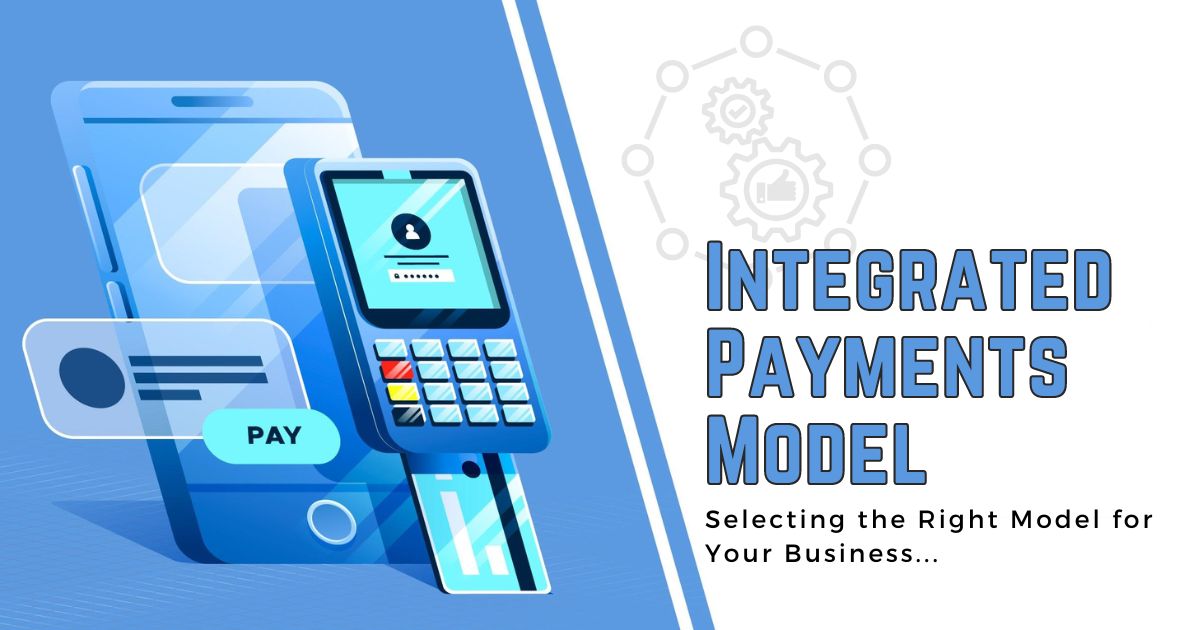
| April 23rd, 2024 |
Integrated Payments Model — Selecting the Right Model for Your Business!
In today’s fast-paced digital economy, businesses of all sizes are constantly looking for methods to streamline their payment procedures. One of the most effective tactics gaining popularity is the integration of payment systems directly into current corporate platforms, often known as integrated payments model. However, with so many models to choose from, it might be difficult to choose the best one for your business. In this detailed article, we’ll look at the complexities of integrated payment models and provide key insights to help you make an informed decision.
Understanding Integrated Payments —
Integrated payments are the smooth integration of payment processing capabilities directly into business management systems or software platforms. Businesses that incorporate payment capability into current workflows can speed transactions, improve customer experience, and get useful insights into financial data—all from a single interface.
The Benefits of Integration —
- Efficiency: Integrated payments eliminate the need for manual data entry, reducing errors and saving time for both customers and employees.
- Enhanced Customer Experience: By offering a seamless payment experience, businesses can improve customer satisfaction and encourage repeat business.
- Streamlined Operations: Integrated systems provide real-time access to transaction data, enabling businesses to make informed decisions and optimize their financial operations.
- Security: Many integrated payment solutions offer advanced security features, such as tokenization and encryption, to protect sensitive payment information from cyber threats.
Choosing the Right Model —
When selecting an integrated payments model for your business, it’s essential to consider your specific needs, industry requirements, and long-term goals. Here are some key factors to consider:
Business Type:
Different sectors have distinct payment processing requirements. Whether you run a retail store, an e-commerce platform, or a service-based firm, select a model that meets your industry’s requirements.
Integration Method:
Integrated payments can be made via a variety of methods, including API integration, hosted payment sites, and pre-built connections with popular software platforms. Evaluate each method’s compatibility with your current systems and technical capabilities.
Cost Structure:
Consider each integrated payments solution’s pricing structure, which includes transaction fees, monthly subscriptions, and any additional fees for enhanced features or support services. Choose a model that has transparent pricing and meets your budgetary requirements.
Scalability:
As your business grows, your payment processing requirements may change. Choose a flexible integrated payments model that can scale with your company and support future growth without needing major adjustments or disruptions to your operations.
Compliance and Security:
Ensure that the integrated payments solution adheres to industry rules such as PCI DSS (Payment Card Industry Data Security Standard) and includes strong security features to safeguard sensitive payment data from unauthorized access or breaches.
Popular Integrated Payments Models —
Payment Gateway Integration:
Integrating a payment gateway enables businesses to accept online payments securely. PayPal, Stripe, authorize net, and Paycron are popular payment gateways that offer customizable APIs for smooth integration with e-commerce platforms and websites.
Point-of-Sale (POS) Integration:
For brick-and-mortar businesses, incorporating payment processing directly into the POS system improves in-person transactions and inventory management. Leading POS suppliers, like as Square and Clover, provide integrated solutions with advanced capabilities for retail and hospitality enterprises.
Accounting Software Integration:
Integrating payment processing with accounting software systems like QuickBooks and Xero allows businesses to automate invoicing, reconcile payments, and maintain financial records more efficiently. This strategy is especially useful for service-oriented organizations and freelancers.
Enterprise Resource Planning (ERP) Integration:
Large businesses frequently demand comprehensive integrated payments solutions that work seamlessly with their ERP systems, such as SAP or Oracle. These systems provide centralized management over financial processes and enable cross-departmental communication.
Conclusion —
Integrated payments provide numerous benefits to organizations looking to streamline their payment procedures and improve customer experience. By knowing the many models available and carefully examining your individual goals and requirements, you may find the ideal integrated payments solution to move your business ahead in today’s competitive landscape. Whether you’re a small business or a huge corporation, adopting integrated payments is a strategic investment that may boost efficiency, increase profitability, and support long-term success.
